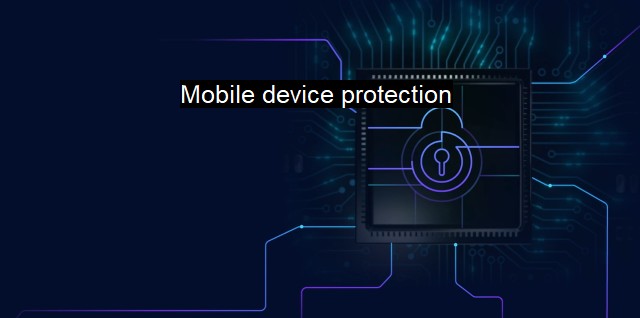What is Mobile device protection?
The Importance of Mobile Device Protection in Today's Cyber Age: Strategies and Solutions for Securing Your Devices from Malicious Attacks
Mobile device protection refers to impenetrable cybersecurity measures taken to secure mobile devices like smartphones, tablets, and laptops from various threats and cyberattacks. With the increasing sophistication of cybercriminals, it becomes paramount for individuals and organizations alike to prioritize mobile device protection, transforming it into an essential element of modern life.The term "cybersecurity" is a broad concept describing techniques, strategies, and measures taken to secure data and prevent unauthorized access to digital platforms. It primarily safeguards systems, networks, and programs from digital threats. In an organizational context, effective cybersecurity involves maintaining stricter protocols and safety measures to manage and mitigate possible cyber risks and threats.
The concept of mobile device protection rests within this broader perspective. It places primary emphasis on securing mobile devices that have become commonplace but are sensitive to cyber threats. Mobile devices can hold a significant amount of confidential data, including personal photographs, card details, and sensitive corporate information. Thus, losing these devices or having them hacked into can result in a severe breach of privacy and loss of valuable data.
It's important to highlight that mobile devices often face multiple kinds of threats. mobile malware, malicious software specifically targeting mobile devices, is designed to steal sensitive data from the device. This malware comes in many variations, including viruses, worms, Trojans, ransomware, and spyware.
Viruses and worms can corrupt or delete files on mobile devices, Trojans deceive users into inviting them willingly into their systems to exploit vulnerabilities, ransomware restricts access to the mobile device until a certain sum of money is paid, and spyware secretly monitors the user's activities, reporting back to the cyber-criminal.
Apart from mobile malware, mobile devices are also threatened by network spoofing attacks, where a network illegitimately poses as another to stage phishing attacks and steal private information. Other vulnerabilities include unsecured Wi-Fi, malicious applications downloaded unknowingly, and SMS phishing schemes intended to trick the user into revealing sensitive information.
Antivirus software is a vital part of any cyber defense strategy and holds particular importance in the realm of mobile device protection. Modern antivirus software has transcended beyond just offering protection from viruses. They now include advanced features like identity theft protection, cloud backup for online and offline data, secure firewalls, spyware removal, and alert mechanisms against suspicious websites.
In the context of mobile device protection, an antivirus serves to protect the device from potentially harmful applications and files. It does a regular scan for viruses and offers options to clean these viruses if found in the file systems. they also offer a barricade against malicious websites, some even remotely block or erase data in case the device is lost or stolen.
Though these methods are effective, it is also crucial to facilitate healthy cybersecurity habits. Regular software updates, limiting installations from unknown sources, exercising vigilance while interacting with emails or sites that might seem suspicious, and regular backups of critical data further reinforce the protection offered by antivirus software.
Mobile device protection, with carries an extensive scope to guard against the intricate web of cyber threats. It is the first barrier of defense to ensure optimum information privacy, data confidentiality, the integrity of software solutions, and securing online identities in the pervasive digital landscape. In the end, protection does not solely mean employing an antivirus but also nurturing an awareness about good cyber hygiene.

Mobile device protection FAQs
What is mobile device protection and why is it important in terms of cybersecurity?
Mobile device protection is any measure taken to secure a mobile device from cyber threats, such as viruses, malware, and hacking attempts. It is essential to maintain the confidentiality and integrity of sensitive information stored on a mobile device, such as credit card numbers, personal login credentials, and other data.What are some common types of mobile device protection software?
Antivirus and anti-malware software are some of the most well-known types of mobile device protection. Other forms of software include firewalls, intrusion detection systems, and virtual private networks (VPNs).How can I tell if my mobile device has been infected with a virus or malware?
Common signs of a virus or malware infection on a mobile device include a decrease in battery life, slow performance, unusually high data usage, and frequent pop-up ads. If you suspect your device is infected, it's crucial to remove the malicious software as soon as possible to avoid further damage.What are some best practices for maintaining mobile device security and protection?
Some recommended practices include installing and regularly updating antivirus and anti-malware software, using strong and unique passwords for all accounts, never clicking on suspicious links or downloading unknown attachments, and enabling two-factor authentication for added security. Additionally, it's important to keep your mobile device's operating system and apps up to date with the latest security patches.| | A | | | B | | | C | | | D | | | E | | | F | | | G | | | H | | | I | | | J | | | K | | | L | | | M | |
| | N | | | O | | | P | | | Q | | | R | | | S | | | T | | | U | | | V | | | W | | | X | | | Y | | | Z | |
| | 1 | | | 2 | | | 3 | | | 4 | | | 7 | | | 8 | | |||||||